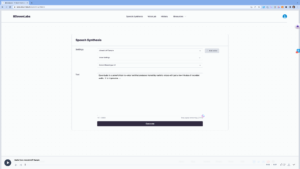Artificial Intelligence (AI) has revolutionized many industries, and the sales industry is no exception. With its ability to analyze vast amounts of data, make accurate predictions, and automate repetitive tasks, AI has become a game-changer in the world of sales.
design-sprints-about

Jeff Oskin
Owner
Artificial Intelligence (AI) has revolutionized many industries, and the sales industry is no exception. With its ability to analyze vast amounts of data, make accurate predictions, and automate repetitive tasks, AI has become a game-changer in the world of sales. In this article, we will explore some of the most impactful AI applications that are transforming sales processes and driving success for businesses. To learn about specific applications and how they might benefit your business, contact Newlogiq today!
1. Predictive Analytics
AI-powered predictive analytics is a powerful tool that enables sales teams to make data-driven decisions and identify potential opportunities. By analyzing historical data and patterns, AI algorithms can predict customer behavior, buying patterns, and sales trends. This allows sales professionals to focus their efforts on high-potential leads and tailor their strategies accordingly, increasing the chances of closing deals successfully.
AI algorithms can also analyze external factors such as market trends and economic indicators to provide a comprehensive view of the sales landscape. This information can help sales teams anticipate changes in customer preferences or market conditions, allowing them to adapt their approach and stay ahead of the competition. Moreover, predictive analytics can assist in demand forecasting, enabling businesses to optimize their inventory levels and ensure timely delivery of products and services.
To further enhance the effectiveness of predictive analytics, sales teams can leverage AI-powered tools that provide real-time insights and recommendations. These tools can highlight leads with the highest conversion probability, suggest the best time to engage with a customer, and even recommend personalized messaging based on individual preferences. By leveraging these capabilities, sales professionals can maximize their efficiency and improve their success rate.
2. Lead Scoring and Qualification
Traditionally, sales teams spent a significant amount of time manually qualifying leads. However, AI has automated this process with the introduction of lead scoring models. AI algorithms can evaluate and rank leads based on various criteria, such as demographic data, online behavior, and engagement levels. This enables sales teams to prioritize their efforts and allocate resources to leads with the highest likelihood of conversion, improving overall sales efficiency.
In addition to lead scoring, AI can also assist in lead qualification by analyzing customer interactions and identifying key buying signals. For example, AI-powered chatbots can engage with potential customers, ask relevant questions, and gather information to determine their level of interest and readiness to make a purchase. This automated qualification process not only saves time but also ensures that sales teams focus their efforts on leads that are most likely to convert, increasing the chances of success.
To further optimize lead scoring and qualification, sales teams can leverage AI-powered tools that integrate with customer relationship management (CRM) systems. These tools can provide real-time updates on lead scores, track progress throughout the sales funnel, and automatically assign leads to the most appropriate sales representatives. By streamlining the lead management process, businesses can ensure that no opportunity is missed and that all leads receive the attention they deserve.
3. Chatbots and Virtual Assistants
AI-powered chatbots and virtual assistants have become invaluable tools for sales teams. These intelligent bots can handle customer queries, provide personalized recommendations, and even assist with product demonstrations. By automating these tasks, sales professionals can focus on building relationships and closing deals, while the chatbots handle routine inquiries, saving time and resources.
AI chatbots can be deployed across various channels, including websites, social media platforms, and messaging apps, allowing businesses to engage with customers wherever they are. These chatbots can provide instant responses to frequently asked questions, guide customers through the purchasing process, and even offer personalized product recommendations based on their preferences and past interactions.
Virtual assistants, on the other hand, can assist sales professionals by providing real-time insights and recommendations during sales calls or meetings. For example, AI-powered virtual assistants can analyze customer profiles, suggest relevant talking points, and provide additional information to support sales pitches. This real-time intelligence enables sales professionals to deliver more personalized and impactful presentations, increasing the chances of closing deals successfully.
To ensure a seamless and personalized customer experience, businesses can leverage AI-powered chatbots and virtual assistants that integrate with CRM systems. These integrations enable the bots to access customer data and provide tailored recommendations based on individual preferences and purchase history. By leveraging these capabilities, businesses can enhance customer satisfaction, increase sales conversion rates, and ultimately drive business growth.
4. Sales Forecasting
Accurate sales forecasting is crucial for effective business planning and resource allocation. AI algorithms can analyze historical sales data, market trends, and external factors to generate reliable sales forecasts. This helps sales teams anticipate demand, optimize inventory levels, and make informed decisions about pricing and promotions, leading to improved sales performance and profitability.
AI-powered sales forecasting models can take into account a wide range of variables, including seasonality, industry trends, economic indicators, and even weather patterns. By considering these factors, businesses can gain a holistic view of the market and make strategic decisions to capitalize on opportunities and mitigate risks.
To enhance the accuracy of sales forecasting, businesses can leverage AI-powered tools that provide real-time data and insights. These tools can integrate with various data sources, such as CRM systems, marketing automation platforms, and external databases, to gather the most up-to-date information. By leveraging these tools, businesses can make more accurate predictions, identify potential bottlenecks in the sales process, and proactively address them to ensure smooth operations.
5. Sales Process Automation
AI enables sales process automation by streamlining repetitive tasks, such as data entry, lead nurturing, and follow-ups. By automating these routine activities, sales professionals can focus on building relationships, identifying new opportunities, and closing deals. This not only increases productivity but also ensures that no leads or tasks fall through the cracks, leading to a more efficient sales process.
AI-powered automation tools can handle various aspects of the sales process, including lead generation, lead qualification, and customer outreach. For example, AI algorithms can analyze customer data to identify patterns and preferences, allowing businesses to create targeted marketing campaigns and personalized communication strategies.
Moreover, AI-powered automation tools can assist in lead nurturing by sending automated follow-up emails, personalized recommendations, and timely reminders. These tools can also provide real-time analytics on customer engagement, allowing sales teams to identify the most effective outreach strategies and refine their approach accordingly.
By leveraging AI-powered sales process automation, businesses can streamline their operations, reduce manual errors, and improve overall efficiency. This not only frees up time for sales professionals to focus on high-value activities but also ensures that every lead receives timely and personalized attention, leading to higher conversion rates and increased revenue.
6. Personalized Sales Recommendations
AI algorithms have the ability to analyze customer data and generate personalized sales recommendations. By leveraging historical purchase behavior, browsing patterns, and demographic data, AI can suggest relevant products and services to individual customers. This level of personalization not only enhances the customer experience but also increases the likelihood of cross-selling and upselling, ultimately boosting sales revenue.
Personalized sales recommendations can be delivered through various channels, including email marketing, website pop-ups, and personalized product recommendations on e-commerce platforms. These recommendations can be based on a variety of factors, such as past purchases, customer preferences, and even real-time browsing behavior.
To further enhance the effectiveness of personalized sales recommendations, businesses can leverage AI-powered tools that integrate with CRM systems and e-commerce platforms. These tools can provide real-time updates on customer profiles, track purchase history, and analyze customer feedback to continuously refine the recommendations.
By leveraging AI-powered personalized sales recommendations, businesses can create a tailored shopping experience for their customers, increase customer satisfaction, and drive repeat purchases. Moreover, by cross-selling and upselling relevant products, businesses can maximize their revenue potential and increase customer lifetime value.
7. Sales Performance Analytics
AI-powered analytics tools allow sales teams to gain deep insights into their performance. By analyzing data on key performance indicators (KPIs) such as conversion rates, win rates, and sales cycle length, AI algorithms can identify areas for improvement and provide actionable recommendations. Sales managers can use these insights to optimize the sales process, coach their team members, and drive better results.
Sales performance analytics can provide a comprehensive view of the entire sales funnel, from lead generation to deal closure. By tracking KPIs at each stage of the sales process, businesses can identify bottlenecks, inefficiencies, and areas of improvement. For example, if the conversion rate from leads to opportunities is low, AI-powered analytics tools can help identify the underlying reasons, such as ineffective lead nurturing or inadequate qualification criteria.
To further enhance sales performance analytics, businesses can leverage AI-powered tools that provide real-time dashboards and reports. These tools can consolidate data from various sources, such as CRM systems, marketing automation platforms, and sales enablement tools, to provide a holistic view of sales performance. By leveraging these tools, businesses can identify trends, set realistic targets, and monitor progress towards their sales goals.
By leveraging AI-powered sales performance analytics, businesses can optimize their sales process, identify areas for improvement, and drive better results. Sales managers can use these insights to coach their team members, provide targeted training, and implement strategies to overcome challenges. Ultimately, this leads to higher sales productivity, increased revenue, and improved overall performance.
8. Sales Enablement
AI can significantly enhance sales enablement efforts by providing sales teams with real-time intelligence and relevant content. AI-powered tools can recommend the most effective sales collateral, suggest optimal messaging for specific customer profiles, and provide valuable insights during sales calls or meetings. By leveraging AI-powered sales enablement platforms, sales professionals can deliver more personalized and impactful pitches, leading to higher conversion rates.
Sales enablement platforms powered by AI can provide sales teams with access to a vast repository of sales collateral, including presentations, case studies, and product brochures. These platforms can use AI algorithms to analyze customer profiles, sales history, and customer feedback to recommend the most relevant content for each sales interaction.
Moreover, AI-powered sales enablement platforms can assist sales professionals during sales calls or meetings by providing real-time insights and suggestions. For example, these platforms can analyze customer data, such as purchase history and browsing behavior, and suggest talking points or cross-selling opportunities. This real-time intelligence enables sales professionals to tailor their pitches to individual customer needs, increasing the chances of success.
By leveraging AI-powered sales enablement, businesses can ensure that sales teams have the right tools and content at their fingertips, enabling them to deliver personalized and impactful pitches. This not only enhances the customer experience but also increases the chances of closing deals successfully and driving business growth.
Conclusion
In conclusion, AI has brought about a paradigm shift in the sales industry, empowering sales teams with intelligent tools and insights. From predictive analytics to sales process automation and personalized recommendations, AI applications are transforming the way sales professionals operate, leading to increased efficiency, improved decision-making, and ultimately, greater sales success. Embracing these game-changing AI applications for sales is essential for businesses looking to stay ahead in today’s competitive market landscape. Contact Newlogiq today to better understand how your sales team might benefit from AI technologies!
FAQ
-
1. What is predictive analytics and how does it benefit sales teams?
Predictive analytics is an AI-powered tool that analyzes historical data and patterns to predict customer behavior, sales trends, and market conditions. It helps sales teams make data-driven decisions, focus on high-potential leads, and tailor their strategies for greater success.
-
2. How does AI automate lead scoring and qualification?
AI algorithms evaluate and rank leads based on criteria such as demographic data and online behavior. AI-powered chatbots can engage with potential customers, gather information, and determine their level of interest. This automation saves time, ensures focus on high-conversion leads, and increases the chances of success for sales teams.
-
3. What are the benefits of using chatbots and virtual assistants in sales?
Chatbots handle routine inquiries and provide personalized recommendations, while virtual assistants provide real-time insights and recommendations during sales calls. By automating these tasks, sales professionals can focus on building relationships and closing deals, leading to increased efficiency and higher success rates.
-
4. How does AI enhance sales forecasting and why is it important for businesses?
AI algorithms analyze historical sales data, market trends, and external factors to generate reliable sales forecasts. Accurate sales forecasting helps businesses anticipate demand, optimize inventory levels, and make informed decisions about pricing and promotions, leading to improved sales performance and profitability.
Back to Homepage
Latest Articles










